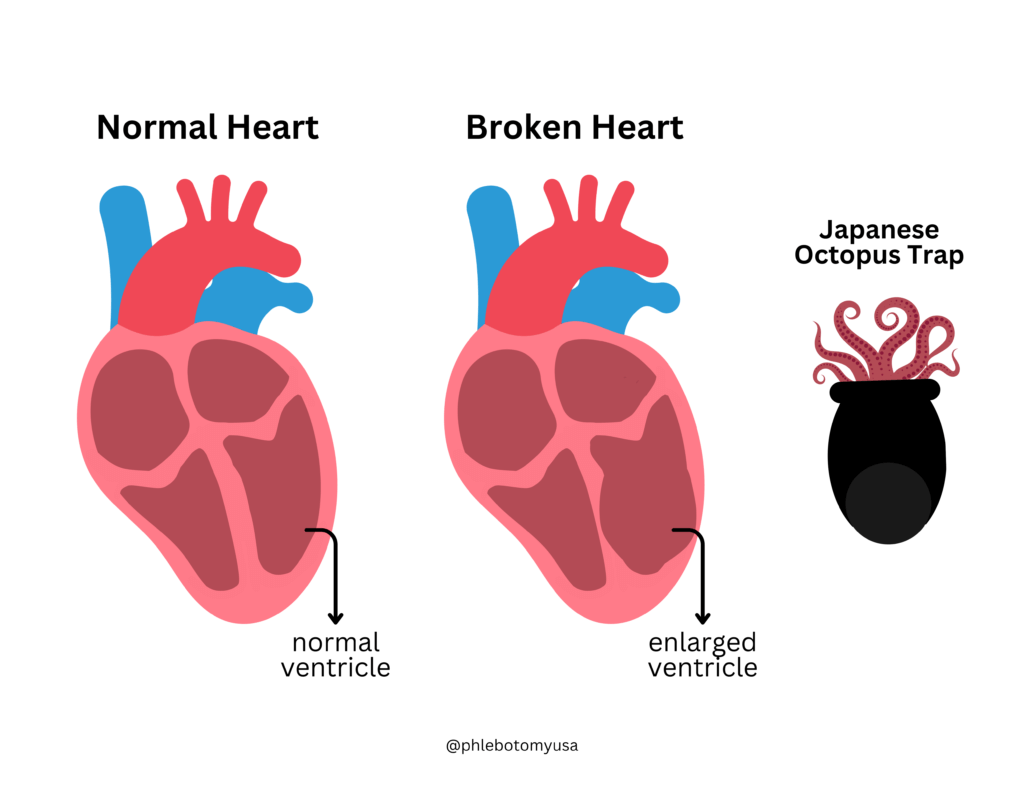12 Feb Yes, You Can Die of A Broken Heart
Have you ever heard someone say they’re so sad it feels like their heart is breaking? It might sound like just a saying, but there’s a real condition called Broken Heart Syndrome that can actually cause serious problems or even death. This condition is also known as Takotsubo Cardiomyopathy and it highlights the deep connection between our emotions and our physical health. Let’s look into what is a broken heart syndrome, why it happens, and who is at risk.
What is Broken Heart Syndrome?
Broken heart syndrome is also called Takotsubo Cardiomyopathy. It happens when strong emotions like grief or stress cause the heart to temporarily stop working properly. It is a rare condition, affecting about 2 out of every 10,000 hospital visits in the U.S. and making up 2% of heart problems that seem like heart attacks.
The name comes from a Japanese word meaning “octopus trap.” While it can happen to anyone under intense emotional or physical stress, it is not caused by blocked arteries like a heart attack. It’s caused by a surge of stress hormones that affect how the heart pumps blood.
Why Does It Happen?
Imagine your heart as a sponge that absorbs emotions. When something very stressful or sad happens, like losing a loved one, your body releases stress hormones, especially adrenaline. In some people, the heart gets overwhelmed by this adrenaline which causes the left ventricle to swell and take on the shape of a Japanese octopus trap.
This odd shape makes the heart pump less effectively, leading to problems in the body. Researchers believe this surge of adrenaline plays a key role in causing broken heart syndrome. While the heart usually returns to normal within days or weeks, the condition can be serious if not treated quickly.
How Does It Show Up?
Broken heart syndrome can feel just like a heart attack, with symptoms like chest pain, shortness of breath, and fatigue. However, unlike a heart attack, there’s no artery blockage. Doctors use tests like EKGs and echocardiograms to diagnose it.
People may also experience palpitations, dizziness, and sweating which are often triggered by a stressful event. The symptoms can be severe enough to require an emergency room visit. Although most people recover fully with proper care, it’s important to seek medical attention if you have any heart attack-like symptoms to avoid complications.
Who Is at Risk?
Broken heart syndrome is more common in women, especially those who are past menopause. Women make up 90% of cases, according to some reports. But that doesn’t mean younger people or men are safe from it. Big emotional shocks are the usual culprits, but even happy surprises can cause it (imagine being so happy it hurts!).
Other risk factors for developing broken heart syndrome include having a history of neurological conditions such as epilepsy or a history of psychiatric disorders like anxiety or depression. Additionally, certain physical stressors, such as severe illness or surgery can also trigger this condition.
While the exact reasons why post-menopausal women are more susceptible remain unclear, it is believed that the decline in estrogen levels may make the heart more vulnerable to the effects of stress hormones.
How Is It Treated?
The good news about Takotsubo Cardiomyopathy is that it’s highly curable. Most people with it start to feel better within weeks, and their heart goes back to normal. The most important part is that people recognize the problem and seek treatment immediately.
Treatment is mostly about helping the symptoms and might include medicines that help the heart and manage stress. It’s also super important for people with this syndrome to find good ways to handle stress, like talking to friends, exercising, or doing things they enjoy.
Wrapping Up
Broken Heart Syndrome shows us how strongly our emotions connect to our physical health. It’s a reminder that taking care of our emotional well-being is just as important as taking care of our bodies. At Phlebotomy Training Specialists, we are committed to providing in-depth education on maintaining overall well-being.
Taking care of your heart both physically and emotionally is highly important, and we’re here to support you every step of the way. If you or someone you know is going through a really tough time, it’s okay to ask for help, whether it’s talking to a trusted adult, a counselor, or a doctor. Remember, both your heart and your feelings deserve care and attention.


